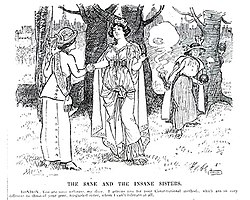User:Stinglehammer/suffrage
Appearance
| This user page or section is in a state of significant expansion or restructuring. You are welcome to assist in its construction by editing it as well. This template was placed by Stinglehammer (talk · contribs). If this user page has not been edited in several days, please remove this template. If you are the editor who added this template and you are actively editing, please be sure to replace this template with {{in use}} during the active editing session. Click on the link for template parameters to use.
This page was last edited by Lirazelf (talk | contribs) 5 years ago. (Update timer) |
Women's suffrage in Scotland has historically been marginalised due to the prominence of societies and political groups in England which led the reform for women throughout the United Kingdom. Due to differing social structures and a heavily industrialised working-class society, the national movement in Scotland grew but then stuttered in the late nineteenth century in comparison with that of England. Nevertheless, distinct Scottish groups and individuals rose to prominence and were vocal in the rise of suffrage in Scotland and the rest of Great Britain. (purloined from Women's suffrage in Wales article so will need rewritten).
The History of Women's Suffrage in Scotland
[edit]Early Women's Suffrage in Scotland, 1832–1884
[edit]Timeline
[edit]
- 1832: Great Reform Act – confirmed the exclusion of women from the electorate.
- 1913, February: A house being built for David Lloyd George is burned down by members of the WSPU.[1]
- 1914, August: World War declared in Britain. WSPU activity immediately ceased. NUWSS activity continued peacefully.
- 1916, December: David Lloyd George replaces Asquith as Prime Minister.
- 1918: The Representation of the People Act of 1918 enfranchised women over the age of 30 who were either a member or married to a member of the Local Government Register. About 8.4 million women gained the vote.[2][3]
- 1918, November: the Eligibility of Women Act was passed, allowing women to be elected into Parliament.[2]
- 1928: Women received the vote on the same terms as men (over the age of 21) as a result of the Representation of the People Act 1928.[4]
See also
[edit]- Suffrage in the United Kingdom
- Feminism in the United Kingdom
- The Women's Library (London)—holds an extensive collection of material relating to the women's suffrage movement
- List of suffragists and suffragettes
- List of women's rights activists
- Timeline of women's suffrage
Footnotes
[edit]Notes
[edit]References
[edit]- ^ Rowland, Peter (1978). David Lloyd George: A Biography. London: Macmillan. p. 228.
- ^ a b Fawcett, Millicent Garrett. The Women's Victory – and After. p.170. Cambridge University Press
- ^ D. E. Butler, The Electoral System in Britain 1918-1951 (1954) pp 7-12
- ^ D. E. Butler, The Electoral System in Britain 1918-1951 (1954) pp. 15-38
External links
[edit]- The struggle for democracy – information on the suffragettes at the British Library learning website
- The Women's Suffrage Movement in Scotland, 1867-1928: A Learning Resource
